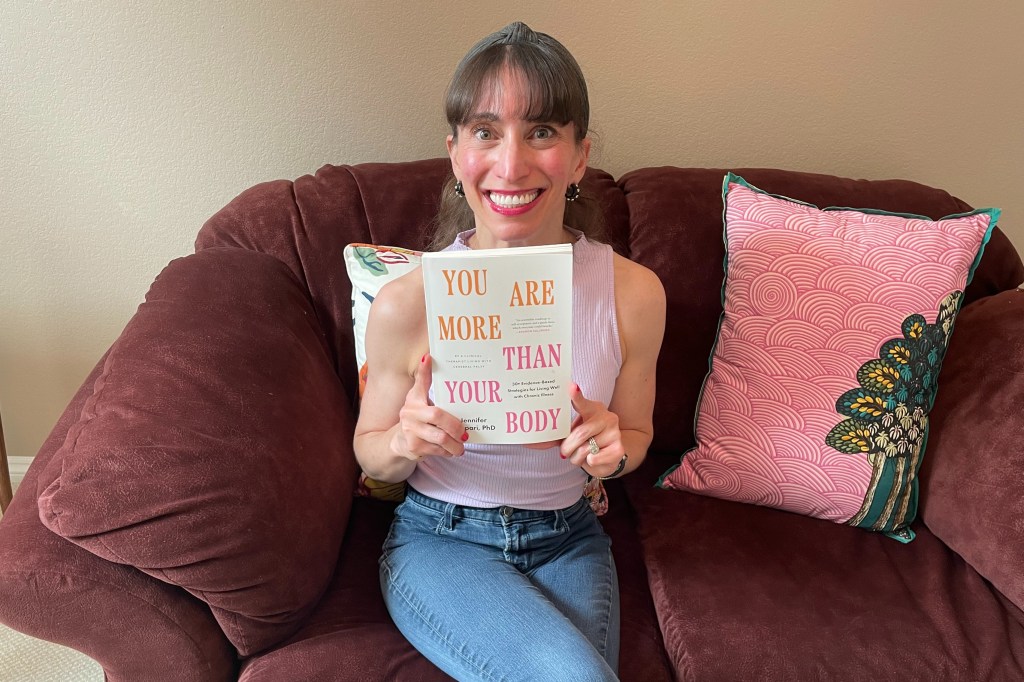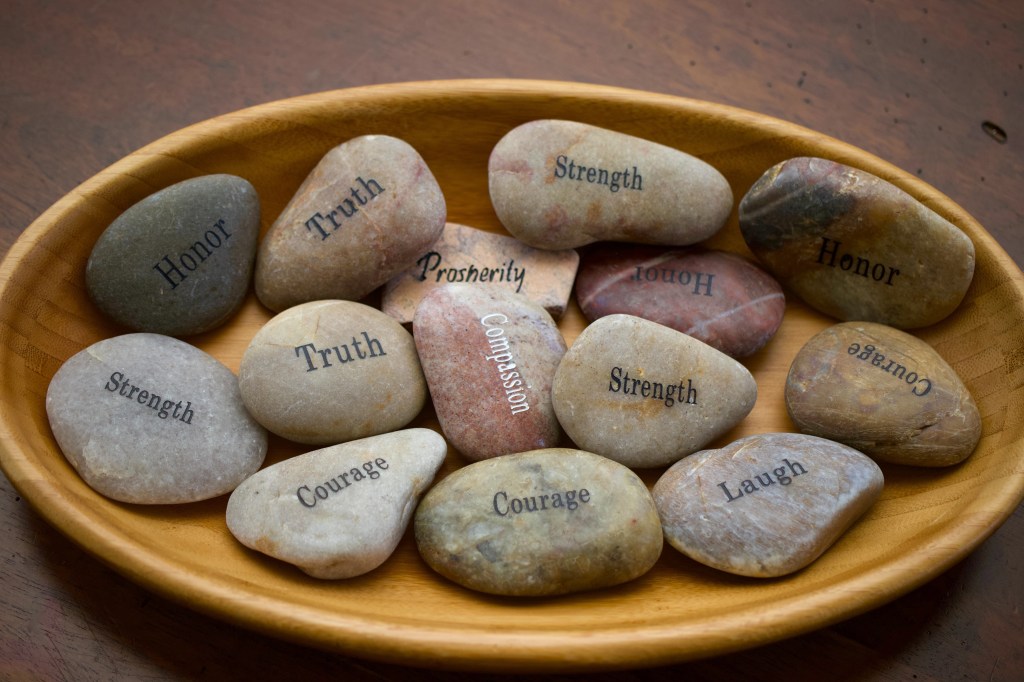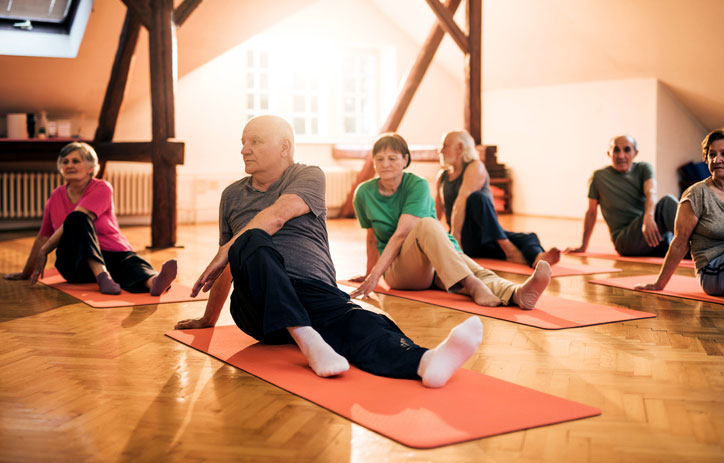When Jennifer Caspari set out to write You Are More Than Your Body, she was hoping to deliver a guidebook that would leave readers who struggle with insecurity feeling empowered, like they have “an increased sense of capability.” As a clinical psychologist, Caspari is trained in helping others achieve self-acceptance — and as someone with cerebral palsy, she’s especially equipped to do so.
Published in June, the book offers practical, evidence-based skills and exercises couched in a collection of personal experiences. Though framed through a lens of living with a disability, and thus likely to particularly resonate with others who have chronic illness, it reads like a universal tool kit, helpful for anyone who feels down about their body.
“They’re just really evidence-based mood skills,” the Denver-based therapist explained to Nice News. “How do we improve our mood? How do we become more flexible with our thinking and our behavior? So that can apply to a wide variety of concerns.”

Caspari recognizes that not everyone can participate in one-on-one therapy — another motivator behind releasing You Are More Than Your Body. The book is split into three sections: Managing Your Emotions, Balancing Your Thoughts, and Caring for Your Body. Along with the skills, she provides self-reflection exercises, and recommends reading with a writing pad or journal handy.
For Caspari, 42, her illness manifests in unpleasant physical sensations, like muscle aches, chronic pain, and fatigue. Through her youth and young adulthood, she also struggled more with emotional and psychological symptoms, like feeling self-conscious about being different, something that still occasionally happens.
“I hope that including some of my personal experience with living with cerebral palsy also just offers people that sense of shared humanity and shared experience,” she said, adding: “I can struggle, too, using these [coping skills], but it’s a process and it’s about progress and inching toward our values. And I really just hope the book helps people feel empowered to do that.”
Below, we dive into a few of the skills Caspari outlines in her book.
Body Neutrality
Early on in You Are More Than Your Body, Caspari presents the concept of body neutrality, or, as she writes, “a neutral attitude toward the body that is realistic, mindful, and flexible.” She explains that research suggests developing body neutrality promotes body satisfaction and positive mood and leads to less appearance-based comparison to others.
To achieve this mindset, she recommends focusing on the function of your body — what it does, not how it looks — and remembering that your body image is flexible, so how you feel about it today may not be how you feel about it next week or next year.
And in what may feel rather revelatory in today’s age, she also points out: “It’s OK not to love your body. You don’t have to love your body to respect and appreciate what it does for you, and you don’t have to put pressure on yourself to love it if that is not how you feel.”
Cultivating Compassion
Self-love doesn’t need to be the end-all goal, but self-acceptance and self-worth are critical to well-being, and the key to cultivating compassion for yourself is recognizing when you’re being self-critical.
To practice speaking to yourself in a compassionate manner, Caspari recommends imagining you’re talking to a person or an animal you love, and thinking what you’d say to them in the same circumstances.
“For example,” she writes, “‘This sounds really difficult, and it also sounds like you are doing the best you can.’ Or, ‘I am here for you. I know you will get through this even if it is tough.’ Or, ‘You are a capable person and it will be OK.’”
Pay attention to the way you say it, too. “Seeing the difference even in your tone of voice inside your own head versus when you’re talking to someone you care about, and then trying to bring those same words that you would use with a loved one and that same tone, that same grace and kindness to ourselves,” she explained to Nice News.
And, Not But
Also called the “Kick Your Buts” or “Get Off Your Buts” exercise, this one is about making room for multiple simultaneous truths, and one Caspari uses all the time in her own life (“I make my partner a little bit annoyed by trying to never say the word ‘but,’” she laughed).
The steps are easy enough: When you find yourself saying “but,” use the word “and” instead. But the simplicity of the swap belies the profundity of its impact.
“When we use the word ‘but,’ we naturally just focus on a portion of our experience. Usually whatever comes after the ‘but,’” she said, adding: “When we use ‘and,’ we’re helping ourselves acknowledge the complexity of experience and the full range of experience.”
She continued: “To use a health psychology example, if I say something to myself, like, ‘I would love to go grab lunch with my friends, and I’m in a lot of pain,’ both can be true. I can genuinely want to grab lunch, and I’m in a lot of pain, so I’m allowing both. And from there I can figure out, ‘Well, if both are true, what’s most helpful to me in this moment?’ So we’re naturally allowing complexity, which opens the door to have more options for how we behave.”
Live Your Values
“I don’t think there’s an exact formula for how we get quality of life, but I think a formula that comes close to it in the therapy world is sort of when our day-to-day behaviors match or up with our larger values, we tend to have stronger quality of life,” said Caspari. “It’s kind of like daily behaviors plus values equals quality of life.”

In this context, values don’t necessarily equate to morals or ethics, but more generally, the things that are important to us. So the first step is figuring out what those things are. Caspari offers dozens of possibilities — words like “wisdom,” “interdependence,” “resilience,” “justice,” and “joy” — and several self-reflection questions to help readers home in on their values.
“What’s meaningful, what do you want your time to be about? How do you want to show up in the world?” she shares in our interview, adding: “It helps us make room for things like chronic pain and chronic illness, because what can be so distressing about things like chronic illness or things like anxiety or depression is they really can limit our quality of life. So even if those things are still there, but we find ways to get a stronger quality of life, well, I would argue that’s what it’s all about.”
RELATED: “You Don’t Have to Change”: Gretchen Rubin Shares 4 Practical Lessons for Leading a Happier Life
When you buy books through our links, Nice News may earn a commission, which helps keep our content free.











